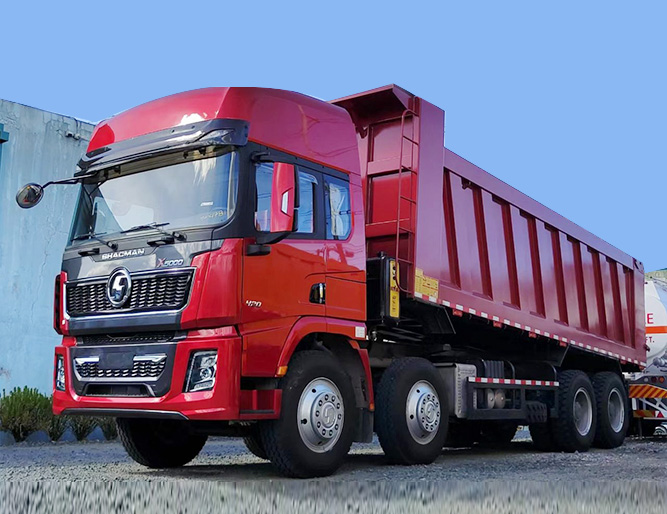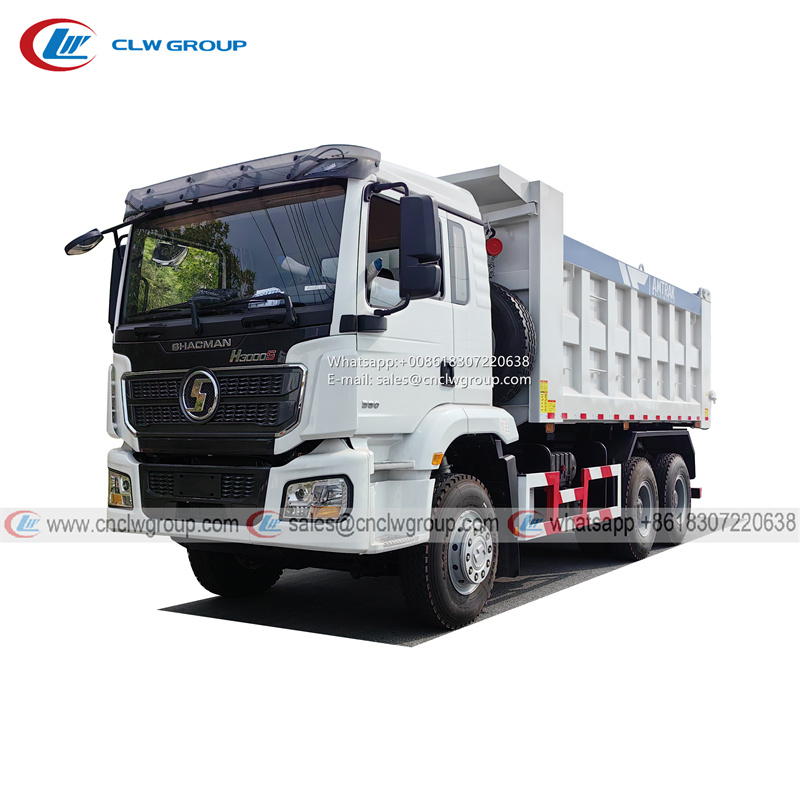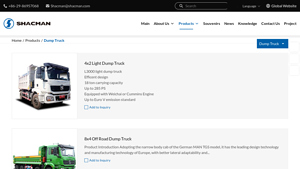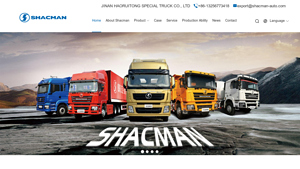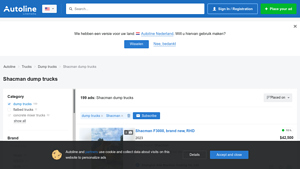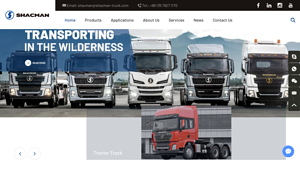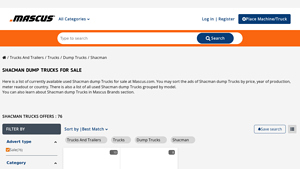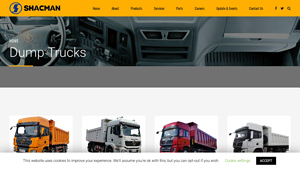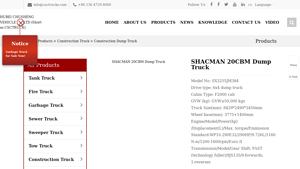Introduction: Navigating the Global Market for shacman Dump Truck
In the dynamic landscape of global construction and transportation, sourcing reliable and efficient shacman dump trucks poses a significant challenge for B2B buyers. With the increasing demand for heavy-duty vehicles capable of handling diverse applications—from construction and mining to logistics—navigating this market requires a strategic approach. This guide offers a comprehensive overview of shacman dump trucks, detailing various types including heavy-duty, off-road, and city dump trucks, along with their specific applications.
International buyers, particularly those from Africa, South America, the Middle East, and Europe, will find valuable insights into supplier vetting processes, cost considerations, and essential features to look for when making a purchase. By equipping buyers with the necessary knowledge to assess product specifications and supplier credibility, this guide empowers informed decision-making. Understanding these factors not only enhances procurement efficiency but also ensures that investments in shacman dump trucks yield maximum operational value.
As you delve into the guide, you will uncover actionable strategies for evaluating suppliers, understanding market trends, and optimizing your purchasing process. Whether you are a seasoned industry professional or a newcomer, this resource is designed to facilitate your journey in sourcing the right shacman dump truck tailored to your specific needs and local market conditions.
Understanding shacman Dump Truck Types and Variations
| Type Name | Key Distinguishing Features | Primary B2B Applications | Brief Pros & Cons for Buyers |
|---|---|---|---|
| X3000 Series | High-end design, fuel-efficient, advanced safety features | Long-distance logistics, transport | Pros: Fuel-efficient, comfortable, durable. Cons: Higher initial cost. |
| H3000 Series | Heavy-duty construction, high payload capacity | Construction, mining, heavy material transport | Pros: Robust design, lower maintenance costs. Cons: Heavier, less maneuverable. |
| F3000 Series | Versatile, high performance, suitable for various terrains | Construction, waste management, general transport | Pros: Adaptable, reliable in tough conditions. Cons: May require more frequent servicing. |
| 6×4 Dump Truck | Standard axle configuration, balanced load distribution | Urban construction, general hauling | Pros: Good stability, efficient for medium loads. Cons: Limited payload compared to 8×4 models. |
| 8×4 Dump Truck | Enhanced load capacity, suitable for heavy-duty applications | Mining, large construction projects | Pros: Higher payload, better for large jobs. Cons: Increased operational costs, requires more space. |
What Are the Characteristics of the X3000 Series Dump Truck?
The X3000 series is engineered for high-end logistics, focusing on long-distance transport. Its European frame structure enhances safety and durability, making it ideal for logistics companies. The truck’s aerodynamic design contributes to fuel efficiency, while features like advanced air conditioning and multifunction steering add to driver comfort. When considering this model, buyers should evaluate their transport distances and the importance of fuel savings against the higher upfront costs.
How Does the H3000 Series Cater to Heavy-Duty Needs?
Designed for heavy-duty applications, the H3000 series excels in transporting large loads and materials, making it a preferred choice in construction and mining sectors. Its robust construction ensures resilience under harsh conditions, thus minimizing maintenance costs over time. Buyers should assess the expected payloads and operational environments to determine if the H3000’s heavy-duty capabilities align with their operational requirements.
Why Choose the F3000 Series for Versatility?
The F3000 series is recognized for its versatility and adaptability across various operational demands, from construction to waste management. Engineered for challenging terrains, it offers enhanced performance and durability. Buyers looking for a reliable truck that can handle diverse tasks should consider this series, keeping in mind that it may require more frequent maintenance due to its extensive use.
What Benefits Does a 6×4 Dump Truck Provide?
The 6×4 dump truck configuration offers a balanced load distribution, making it suitable for urban construction and general hauling tasks. Its stability allows for efficient transportation of medium loads, making it a cost-effective choice for many businesses. However, potential buyers should be aware that while it serves well for moderate payloads, it may not meet the needs of larger projects requiring greater capacity.
When Is an 8×4 Dump Truck the Right Choice?
The 8×4 dump truck is designed for heavy-duty applications, featuring an enhanced load capacity ideal for mining and large construction projects. Its robust design allows it to handle significant weights, making it a valuable asset for companies engaged in substantial operations. However, buyers should consider the increased operational costs and space requirements associated with this model, ensuring it fits within their logistical frameworks.
Key Industrial Applications of shacman Dump Truck
| Industry/Sector | Specific Application of shacman Dump Truck | Value/Benefit for the Business | Key Sourcing Considerations for this Application |
|---|---|---|---|
| Construction | Material transport for site development | Efficient movement of heavy materials reduces delays | Payload capacity, durability, and fuel efficiency |
| Mining | Transporting ore and waste materials | Enhances productivity and operational efficiency | Off-road capability and rugged design |
| Waste Management | Collection and disposal of construction debris | Streamlines waste removal processes | Size and capacity of the dump bed, ease of maintenance |
| Agriculture | Transporting soil, fertilizers, and harvested crops | Supports timely agricultural operations | Versatility in payload types and road conditions |
| Logistics and Transportation | Long-distance transportation of bulk materials | Cost-effective logistics solutions | Fuel efficiency, reliability, and cargo capacity |
How Does the Construction Industry Utilize shacman Dump Trucks?
In the construction sector, shacman dump trucks are essential for transporting materials such as gravel, sand, and concrete to and from job sites. Their robust build and significant payload capacity enable them to carry heavy loads, thus minimizing the number of trips required and optimizing project timelines. International buyers should consider the truck’s durability and fuel efficiency, especially in regions with challenging road conditions, to ensure long-term operational efficiency.
What Role Do shacman Dump Trucks Play in Mining Operations?
In mining, shacman dump trucks are utilized for the transportation of ore and waste materials. Their heavy-duty construction allows them to navigate rough terrains and carry substantial loads, which is critical for maintaining productivity in mining operations. Buyers in this sector must prioritize trucks with strong off-road capabilities and high payload capacities to meet the demands of their specific mining environments.
How Are shacman Dump Trucks Used in Waste Management?
For waste management, shacman dump trucks facilitate the collection and transportation of construction debris and other waste materials. Their design allows for efficient loading and unloading, which streamlines waste disposal processes. When sourcing for this application, businesses should focus on the size and capacity of the dump bed, ensuring it meets the volume of waste generated, along with ease of maintenance to minimize downtime.
What Are the Applications of shacman Dump Trucks in Agriculture?
In the agricultural sector, shacman dump trucks are employed for transporting soil, fertilizers, and harvested crops. Their versatility makes them suitable for various agricultural tasks, helping to ensure timely operations. Buyers should assess the truck’s adaptability to different payload types and its performance on rural roads, which can often be less stable and well-maintained.
How Do shacman Dump Trucks Enhance Logistics and Transportation?
In logistics and transportation, shacman dump trucks are used for the long-distance movement of bulk materials, providing cost-effective solutions for businesses. Their fuel efficiency and reliability are key selling points, making them an attractive option for companies looking to optimize their logistics operations. When sourcing these trucks, businesses should evaluate cargo capacity and overall performance to ensure they meet their logistical needs effectively.
3 Common User Pain Points for ‘shacman Dump Truck’ & Their Solutions
Scenario 1: Difficulties in Sourcing Reliable Parts for Maintenance
The Problem: B2B buyers often face challenges sourcing reliable spare parts for Shacman dump trucks, particularly in regions with limited access to authorized dealers or service centers. This can lead to extended downtime due to delays in repairs, which is detrimental to operational efficiency and project timelines. Moreover, the risk of using substandard parts can compromise the vehicle’s performance and safety, raising concerns about the longevity of the truck and the overall cost-effectiveness of the investment.
The Solution: To mitigate these issues, buyers should establish direct relationships with reputable manufacturers or authorized distributors of Shacman dump trucks. Engaging in discussions during the procurement phase to outline maintenance needs can help ensure that a consistent supply of genuine parts is available. Additionally, buyers can consider creating a maintenance inventory based on their operational needs, allowing them to stock essential components. Utilizing technology, such as inventory management systems, can also streamline the tracking of parts and alert users when it’s time to reorder. For regions with limited access, forming cooperative agreements with other local businesses can enhance purchasing power and ensure that a collective inventory is maintained, thus reducing downtime.
Scenario 2: Navigating Regulatory Compliance and Vehicle Specifications
The Problem: International B2B buyers often encounter complex regulatory environments when importing heavy machinery like Shacman dump trucks. Different countries have varying standards regarding emissions, safety, and specifications that trucks must meet. Failure to comply with these regulations can lead to costly fines, delays in delivery, and even the inability to operate the vehicle in certain areas.
The Solution: Buyers should conduct thorough research on the regulatory requirements of their target markets before making a purchase. Engaging with local compliance experts or consultants who specialize in automotive regulations can provide invaluable insights. Moreover, it is advisable to request detailed specifications and certifications from the manufacturer, ensuring that the trucks meet both local and international standards. Buyers can also leverage the expertise of the manufacturer’s customer service team, which can guide them in customizing the dump truck to meet specific regulatory needs. Establishing clear communication channels with the manufacturer can also facilitate quick responses to any compliance-related queries.
Scenario 3: Managing Performance Expectations in Varied Work Environments
The Problem: B2B buyers often struggle with aligning the performance capabilities of Shacman dump trucks with the diverse demands of different job sites, especially in sectors like construction and mining. Buyers may be uncertain about which model is best suited for specific tasks, leading to potential underperformance or over-specification of vehicles. This mismatch can result in unnecessary expenditure and operational inefficiencies.
The Solution: To address this challenge, buyers should conduct a thorough assessment of their operational requirements, including load types, terrain, and frequency of use. Engaging with Shacman’s sales team for a detailed consultation can provide insights into the most suitable models based on specific applications. Utilizing tools such as load calculators and terrain analysis can help buyers make informed decisions. Additionally, considering the total cost of ownership, including fuel efficiency and maintenance needs, will provide a clearer picture of which model will deliver the best return on investment. Buyers may also benefit from pilot testing a model on-site to evaluate its performance in real-world conditions before committing to a larger purchase.
Strategic Material Selection Guide for shacman Dump Truck
What Are the Key Materials Used in Shacman Dump Trucks?
When selecting materials for Shacman dump trucks, it’s crucial to consider their properties, advantages, and limitations from a B2B perspective. This analysis focuses on four common materials: high-strength steel, aluminum alloys, rubber, and composite materials. Each material plays a vital role in enhancing the truck’s performance and longevity, especially in diverse operating conditions across various international markets.
How Does High-Strength Steel Contribute to Dump Truck Durability?
High-strength steel is commonly used for the chassis and cargo bed of Shacman dump trucks. Its key properties include excellent tensile strength, resistance to deformation under heavy loads, and good weldability. This material can withstand high temperatures and pressures, making it suitable for heavy-duty applications like mining and construction.
Pros: High-strength steel offers exceptional durability and resistance to wear, making it ideal for rugged environments. It is relatively cost-effective compared to other materials, providing a good balance between performance and price.
Cons: The primary drawback is its susceptibility to corrosion, particularly in humid or saline environments. This necessitates protective coatings or treatments, which can increase manufacturing complexity and costs.
Impact on Application: High-strength steel is compatible with various media, including aggregate materials and heavy machinery. However, international buyers should ensure compliance with local standards, such as ASTM or DIN, to guarantee quality and safety.
What Role Do Aluminum Alloys Play in Weight Reduction?
Aluminum alloys are often utilized in components like the truck’s body and certain structural elements. They are lightweight yet strong, offering a favorable strength-to-weight ratio. This material is particularly advantageous for improving fuel efficiency and payload capacity.
Pros: The lightweight nature of aluminum alloys contributes to lower fuel consumption and increased payloads, which are critical for logistics and transportation companies. Additionally, aluminum is resistant to corrosion, reducing maintenance needs over time.
Cons: The primary limitation is cost; aluminum alloys are generally more expensive than high-strength steel. Furthermore, they may not provide the same level of impact resistance, making them less suitable for extremely heavy-duty applications.
Impact on Application: Aluminum alloys are ideal for applications requiring frequent transport over long distances, particularly in logistics-heavy markets like Europe and South America. Buyers should consider the local availability of aluminum and its compliance with relevant standards.
How Do Rubber Components Enhance Performance?
Rubber is essential for tires and various seals in Shacman dump trucks. Its key properties include excellent flexibility, shock absorption, and resistance to wear and tear. Rubber can perform well under a wide range of temperatures and pressures, making it suitable for diverse environments.
Pros: Rubber provides superior traction and comfort, enhancing vehicle performance on rough terrains. It also plays a crucial role in vibration dampening, contributing to driver comfort and reducing fatigue.
Cons: The main disadvantage is that rubber components can degrade over time due to exposure to UV light and extreme temperatures. Regular maintenance and replacement are necessary to ensure optimal performance.
Impact on Application: Rubber is compatible with various terrains, making it suitable for construction sites and mining operations. International buyers should consider local climate conditions, as they can significantly affect rubber longevity.
What Advantages Do Composite Materials Offer for Shacman Dump Trucks?
Composite materials, which combine different materials to enhance performance, are increasingly used in specialized applications within dump trucks. They offer unique properties such as high strength-to-weight ratios and excellent resistance to corrosion and impact.
Pros: Composites can significantly reduce weight while maintaining structural integrity, leading to improved fuel efficiency. They are also resistant to corrosion, which is particularly beneficial in harsh environments.
Cons: The primary limitation of composite materials is their higher cost compared to traditional materials like steel and aluminum. Additionally, manufacturing processes for composites can be more complex, which may lead to longer lead times.
Impact on Application: Composites are particularly useful in applications requiring high durability and low weight, such as in specialized construction or waste management. Buyers should ensure that composite materials meet local regulatory standards.
Summary Table of Material Selection for Shacman Dump Trucks
| Material | Typical Use Case for shacman Dump Truck | Key Advantage | Key Disadvantage/Limitation | Relative Cost (Low/Med/High) |
|---|---|---|---|---|
| High-Strength Steel | Chassis and cargo bed | Exceptional durability and wear resistance | Susceptible to corrosion | Medium |
| Aluminum Alloys | Body and structural components | Lightweight, improves fuel efficiency | Higher cost, lower impact resistance | High |
| Rubber | Tires and seals | Superior traction and comfort | Degrades over time, requires maintenance | Medium |
| Composite Materials | Specialized applications | High strength-to-weight ratio, corrosion resistant | Higher cost, complex manufacturing | High |
This strategic material selection guide provides B2B buyers with essential insights into the materials used in Shacman dump trucks, enabling informed decisions based on operational needs and local market conditions.
In-depth Look: Manufacturing Processes and Quality Assurance for shacman Dump Truck
What Are the Main Stages of Manufacturing Shacman Dump Trucks?
The manufacturing process of Shacman dump trucks is a comprehensive and meticulously structured procedure that ensures high-quality vehicles are produced consistently. The main stages include material preparation, forming, assembly, and finishing.
Material Preparation
The first stage involves the selection and preparation of raw materials. Shacman utilizes high-grade steel alloys such as Q255 and Q355, which are crucial for the structural integrity of the dump trucks. These materials undergo rigorous quality checks to ensure they meet the required specifications for strength and durability. The steel is then cut and shaped into the necessary components using advanced machinery, ensuring precision and consistency.
What Techniques Are Used in Forming and Assembly?
In the forming stage, several techniques are employed, including robotic welding and stamping. Robotic welding allows for high precision and repeatability, ensuring that the joints are strong and reliable. Additionally, the stamping process shapes the metal components into parts like the truck frame, chassis, and cargo bed, which are critical for the truck’s functionality.
During the assembly stage, these components are brought together. This includes installing the engine, transmission, axles, and electrical systems. Each assembly line is organized to maximize efficiency and minimize the risk of errors. Workers are trained extensively to handle various components and ensure that each part is fitted correctly.
How Does the Finishing Process Enhance Quality?
Finishing is the final stage of manufacturing where the dump trucks are painted, inspected, and prepared for shipping. This stage includes applying protective coatings that enhance durability and resist corrosion, essential for vehicles operating in harsh environments. The trucks undergo thorough inspections at various checkpoints to ensure that they meet the stringent quality standards set by Shacman.
What Quality Assurance Standards Are Followed in Shacman Dump Truck Production?
Quality assurance is integral to Shacman’s manufacturing philosophy. The company adheres to international standards such as ISO 9001, which focuses on quality management systems. This certification ensures that processes are in place to maintain consistent quality throughout production. Additionally, Shacman complies with industry-specific standards, including CE marking for safety and environmental regulations, as well as API standards for performance and reliability.
What Are the Key Quality Control Checkpoints?
Shacman implements a multi-tiered quality control (QC) system that includes several checkpoints: Incoming Quality Control (IQC), In-Process Quality Control (IPQC), and Final Quality Control (FQC).
-
Incoming Quality Control (IQC): This checkpoint ensures that all materials and components received meet the required specifications before they are used in production. Random sampling and testing are conducted to verify the quality of incoming materials.
-
In-Process Quality Control (IPQC): Throughout the manufacturing process, various inspections are performed. This includes monitoring the welding quality, dimensional accuracy of components, and functionality tests of mechanical systems.
-
Final Quality Control (FQC): Once the assembly is complete, each dump truck undergoes a final inspection. This includes a comprehensive review of the vehicle’s performance, safety features, and aesthetic quality. Only trucks that pass this rigorous inspection are approved for shipment.
What Common Testing Methods Are Employed for Quality Assurance?
Shacman employs several testing methods to ensure that the dump trucks meet performance and safety standards. Common methods include:
-
Load Testing: Trucks are subjected to heavy loads to assess their structural integrity and performance under stress. This is critical for ensuring the vehicles can handle the demands of construction and mining operations.
-
Durability Testing: Vehicles are tested under various environmental conditions to simulate real-world usage. This includes extreme temperatures and rough terrains to evaluate how well they perform in challenging situations.
-
Safety Testing: All safety features, such as brakes and lighting, are thoroughly tested to ensure compliance with international safety standards.
How Can B2B Buyers Verify Supplier Quality Control?
For international B2B buyers, particularly those in Africa, South America, the Middle East, and Europe, verifying the quality control processes of suppliers is vital. Here are several strategies:
-
Conducting Audits: Buyers can request to conduct on-site audits of the manufacturing facilities. This allows them to observe the production processes firsthand and assess the quality control measures in place.
-
Requesting Quality Reports: Suppliers should provide documentation of their quality control processes, including inspection reports and certifications. This transparency is crucial for building trust.
-
Utilizing Third-Party Inspectors: Engaging third-party inspection services can provide an unbiased assessment of the manufacturing processes and quality control measures. These inspectors can verify compliance with international standards and provide detailed reports.
What Are the QC and Certification Nuances for International B2B Buyers?
International buyers should be aware of specific nuances regarding quality control and certification. Different regions may have varying standards and requirements, which can affect the importation and use of Shacman dump trucks. For example:
-
Regional Certifications: Buyers in Europe may require specific EU certifications, while those in Africa might prioritize compliance with local standards. Understanding these requirements is crucial for smooth importation.
-
Documentation Requirements: Buyers should ensure that all necessary documentation, including customs clearance and safety certifications, is available and compliant with local regulations.
-
After-Sales Support and Warranty: It is essential for buyers to clarify warranty terms and after-sales support provided by suppliers. This includes understanding the process for obtaining spare parts and technical support.
By focusing on these aspects, B2B buyers can make informed decisions when sourcing Shacman dump trucks, ensuring they receive high-quality vehicles that meet their operational needs.
Practical Sourcing Guide: A Step-by-Step Checklist for ‘shacman Dump Truck’
Introduction
Sourcing a Shacman Dump Truck requires careful consideration to ensure that you select a model that meets your operational needs while also partnering with a reliable supplier. This checklist will guide you through the essential steps to make an informed purchasing decision, from defining your requirements to verifying supplier credentials.
Step 1: Define Your Technical Specifications
Begin by clearly outlining your technical requirements for the dump truck. Consider factors such as load capacity, engine specifications, and intended use (e.g., mining, construction, or waste management).
- Load Capacity: Assess the weight of materials you plan to transport to choose a model that can handle your needs without overloading.
- Engine Specifications: Look for engines that meet local emissions standards and provide the horsepower necessary for your specific applications.
Step 2: Research Available Models
Shacman offers several dump truck series, including the F3000, H3000, and X3000, each designed for different applications. Research these models to understand their features and benefits.
- F3000 Series: Known for its versatility and performance, ideal for various operations.
- H3000 Series: Heavy-duty construction suited for transporting heavy materials.
- X3000 Series: Optimized for long-distance logistics, focusing on fuel efficiency and comfort.
Step 3: Evaluate Potential Suppliers
Thoroughly vet your potential suppliers before making a commitment. Request detailed company profiles, product catalogs, and references from previous buyers.
- Company Profile: Investigate the supplier’s history and reputation in the market.
- Case Studies: Look for examples of similar projects they have successfully completed.
Step 4: Verify Supplier Certifications
Ensure that your chosen supplier holds the necessary certifications and complies with international standards. Certifications can indicate the quality of the manufacturing process and the reliability of the product.
- ISO Certification: A sign of quality management and adherence to industry standards.
- Local Compliance: Confirm that the supplier meets regulations specific to your region, especially regarding emissions and safety.
Step 5: Request Quotations and Compare Costs
Once you have shortlisted suppliers, request detailed quotations that outline pricing, terms, and conditions. This step is crucial for budget planning.
- Breakdown of Costs: Ensure that the quote includes all costs, such as shipping, taxes, and any additional fees.
- Payment Terms: Compare payment options and terms to find the most favorable conditions.
Step 6: Assess After-Sales Support and Warranty
Evaluate the after-sales support offered by the supplier, as this can significantly impact your long-term satisfaction with the purchase.
- Warranty Coverage: Look for comprehensive warranties that cover key components such as the engine and transmission.
- Technical Support: Confirm that the supplier provides ongoing technical support and has a reliable parts supply system.
Step 7: Finalize the Purchase Agreement
After selecting a supplier, ensure that all terms and conditions are clearly outlined in a formal purchase agreement. This step protects your interests and clarifies expectations.
- Contract Details: Review the contract for clarity on delivery timelines, payment schedules, and dispute resolution processes.
- Signatures: Ensure that both parties sign the agreement to formalize the transaction.
By following these steps, you can streamline the sourcing process for Shacman Dump Trucks and ensure that you make a well-informed investment.
Comprehensive Cost and Pricing Analysis for shacman Dump Truck Sourcing
What Are the Key Cost Components in Sourcing Shacman Dump Trucks?
When considering the sourcing of Shacman dump trucks, understanding the cost structure is essential. The primary components include materials, labor, manufacturing overhead, tooling, quality control (QC), logistics, and profit margins.
-
Materials: The cost of raw materials such as steel and other components significantly influences the overall pricing. The use of high-quality materials, like Q255 and NM450 steel for the truck bodies, can lead to increased durability and performance but may also raise costs.
-
Labor: Labor costs in manufacturing can vary depending on the region. Countries with lower labor costs might offer competitive pricing but could affect quality if not managed properly. It’s essential to evaluate the workforce skills and expertise in the manufacturing processes.
-
Manufacturing Overhead: This includes costs related to utilities, factory maintenance, and administration. Efficient manufacturing processes can reduce overhead, which in turn can lower the price for buyers.
-
Tooling: Investment in tooling for truck production is significant, especially for customized models. The tooling costs are amortized over the production volume; thus, higher volumes can lead to lower per-unit costs.
-
Quality Control (QC): Ensuring that each truck meets specific standards incurs costs. However, robust QC processes prevent future warranty claims and maintenance issues, providing long-term savings.
-
Logistics: Transporting dump trucks internationally involves significant logistics costs, including shipping, insurance, and customs duties. The choice of shipping method (bulk cargo vs. RORO) can impact these costs.
-
Margin: Finally, manufacturers add a profit margin to cover their business expenses and ensure sustainability. This margin can vary widely based on market conditions and supplier relationships.
What Influences the Pricing of Shacman Dump Trucks?
Several factors influence the final pricing of Shacman dump trucks:
-
Volume/MOQ: Bulk purchases can lead to significant discounts. Suppliers are often willing to negotiate on price when buyers commit to larger orders.
-
Specifications/Customization: Custom features or specific configurations can increase costs. Providing detailed specifications can help suppliers offer more accurate pricing.
-
Materials: The choice of materials directly affects the cost. Premium materials may enhance performance but will also lead to higher prices.
-
Quality and Certifications: Compliance with international quality standards can increase costs but assures buyers of reliability and performance. Ensure that suppliers can provide necessary certifications.
-
Supplier Factors: The reputation and reliability of the supplier can influence pricing. Established suppliers with a proven track record may charge more due to their quality assurance processes.
-
Incoterms: Understanding the terms of shipment (e.g., FOB, CIF) is crucial for budgeting. Different terms can shift costs between buyer and seller, impacting the total cost of ownership.
What Buyer Tips Can Enhance Cost-Efficiency in Sourcing?
For international B2B buyers, particularly from Africa, South America, the Middle East, and Europe, several strategies can enhance cost-efficiency:
-
Negotiation: Engage in thorough negotiations. Suppliers may have room for discounts, especially on larger orders or long-term contracts.
-
Total Cost of Ownership (TCO): Consider not just the purchase price but the entire lifecycle cost, including maintenance, fuel efficiency, and resale value. A slightly higher upfront cost can be justified if the truck offers lower operating costs.
-
Pricing Nuances: Be aware that pricing may fluctuate based on market demand, currency exchange rates, and geopolitical factors. Regular market analysis can help buyers make informed decisions.
-
Supplier Diversification: Avoid reliance on a single supplier. Exploring multiple suppliers can lead to competitive pricing and better terms.
Conclusion
In conclusion, understanding the comprehensive cost structure and pricing factors when sourcing Shacman dump trucks is vital for international B2B buyers. By focusing on key cost components, being aware of pricing influencers, and applying strategic buyer tips, companies can make informed purchasing decisions that align with their operational needs and budget constraints. Always remember that indicative prices may vary based on market conditions and specific requirements.
Alternatives Analysis: Comparing shacman Dump Truck With Other Solutions
Understanding Alternatives in Dump Truck Solutions
When considering the acquisition of a dump truck, it is essential for B2B buyers to evaluate various alternatives to ensure the chosen solution meets their specific operational needs. The market offers a range of options, including different brands and types of dump trucks, each with unique features and capabilities. This analysis will compare the Shacman Dump Truck with two viable alternatives: the Volvo FMX and the Caterpillar 770G.
Comparison Table
| Comparison Aspect | Shacman Dump Truck | Volvo FMX | Caterpillar 770G |
|---|---|---|---|
| Performance | High durability, various models | Advanced stability, strong payload | Designed for heavy loads, excellent traction |
| Cost | Competitive pricing | Higher initial investment | Premium pricing for robust features |
| Ease of Implementation | Simple setup and operation | Requires training for advanced features | Straightforward but may need operator training |
| Maintenance | Generally low maintenance cost | Moderate maintenance needs | High durability, but parts can be costly |
| Best Use Case | Construction, mining, waste management | Heavy-duty construction and logging | Mining and heavy earthmoving operations |
Detailed Breakdown of Alternatives
Volvo FMX
The Volvo FMX is designed for heavy-duty applications, particularly in construction and logging. Its advanced stability and payload capacity make it suitable for rough terrains. However, the initial investment is higher than that of the Shacman Dump Truck, which may deter some buyers. Additionally, while the FMX is equipped with numerous advanced features, these often require operator training, increasing the overall implementation time and cost. Despite these factors, its reputation for safety and reliability can justify the investment for businesses focused on long-term operations.
Caterpillar 770G
The Caterpillar 770G is a robust solution tailored for mining and heavy earthmoving tasks. Its design emphasizes traction and load-bearing capabilities, making it an excellent choice for challenging environments. However, while its durability is commendable, the costs associated with parts and maintenance can be significant. Companies in need of a highly specialized vehicle for severe conditions may find the 770G worthwhile, but it may not be the most cost-effective option for general construction or waste management tasks compared to the Shacman Dump Truck.
Conclusion: How to Choose the Right Dump Truck Solution
When selecting a dump truck solution, B2B buyers should consider their specific operational requirements, including the types of materials being transported, the terrain, and budget constraints. The Shacman Dump Truck offers a competitive balance of performance and cost, making it suitable for a variety of applications. Conversely, alternatives like the Volvo FMX and Caterpillar 770G provide specialized features that may justify their higher costs in specific scenarios. Ultimately, a thorough assessment of operational needs, financial implications, and long-term goals will guide buyers in choosing the most appropriate dump truck solution for their business.
Essential Technical Properties and Trade Terminology for shacman Dump Truck
What Are the Essential Technical Properties of Shacman Dump Trucks?
When evaluating Shacman Dump Trucks, understanding their technical specifications is crucial for B2B buyers. Here are some key properties that significantly influence performance and suitability for various applications:
-
Payload Capacity
The payload capacity, typically ranging from 16 to 60 tons depending on the model, indicates the maximum weight the truck can carry. This is essential for businesses in construction, mining, and logistics as it directly affects operational efficiency and profitability. A higher payload capacity means fewer trips are needed to transport materials, thereby reducing fuel costs and time. -
Engine Specifications
Shacman Dump Trucks feature a range of engines, including models like the WEI CHAI and WP series, with horsepower options from 340 to 430. The choice of engine not only impacts performance but also fuel efficiency and compliance with emissions regulations. Understanding the engine type helps buyers select a truck that meets their operational needs while adhering to environmental standards. -
Material Quality
The construction of the dump truck’s body often utilizes high-strength steel grades such as Q255, Q355, and NM450. These materials enhance durability and resistance to wear and tear, crucial for trucks operating in harsh conditions. Selecting a truck made from superior materials ensures longevity and lower maintenance costs, which are vital for businesses operating on tight budgets. -
Suspension System
Shacman trucks are equipped with advanced suspension systems designed for heavy-duty performance. Features like reinforced leaf springs and hydraulic suspension enhance stability and comfort during transport, especially over rough terrains. A robust suspension system is essential for maintaining cargo integrity and ensuring driver safety, making it a critical factor for buyers. -
Transmission and Axle Configuration
Shacman Dump Trucks typically feature 10-speed or 12-speed manual transmissions, paired with MAN axles. This combination allows for better torque management and power distribution, essential for navigating challenging road conditions. Understanding transmission options helps buyers choose a truck that aligns with their operational environments and driving preferences.
What Trade Terminology Should B2B Buyers Understand When Purchasing Shacman Dump Trucks?
Navigating the procurement of Shacman Dump Trucks involves familiarizing oneself with specific industry terminology. Here are some commonly used terms that can aid in making informed purchasing decisions:
-
OEM (Original Equipment Manufacturer)
This term refers to the company that produces the original parts for a vehicle. For buyers, ensuring that the truck includes OEM parts can guarantee quality and compatibility, which is vital for long-term reliability and maintenance. -
MOQ (Minimum Order Quantity)
MOQ indicates the smallest number of units a supplier is willing to sell. Understanding MOQ is essential for businesses looking to manage inventory costs while ensuring they meet their operational needs without over-purchasing. -
RFQ (Request for Quotation)
An RFQ is a formal document requesting pricing and terms from suppliers. Utilizing RFQs allows businesses to compare offers effectively, ensuring they receive the best value for their investment in dump trucks. -
Incoterms (International Commercial Terms)
These are standard trade terms that define the responsibilities of buyers and sellers in international transactions. Familiarity with Incoterms is crucial for B2B buyers to understand shipping responsibilities, risk management, and cost implications involved in importing dump trucks. -
Tare Weight
The tare weight refers to the weight of the truck without any cargo. Knowing the tare weight is important for calculating payload capacity and understanding how much load the truck can carry legally and efficiently. -
Lead Time
This term denotes the time taken from placing an order to receiving the product. Understanding lead times is crucial for planning and ensuring that equipment is available when needed, especially for projects with tight timelines.
By grasping these technical properties and trade terms, B2B buyers can make informed decisions when purchasing Shacman Dump Trucks, ultimately leading to enhanced operational efficiency and profitability.
Navigating Market Dynamics and Sourcing Trends in the shacman Dump Truck Sector
What Are the Key Market Trends Influencing the Shacman Dump Truck Sector?
The global dump truck market is experiencing a significant transformation driven by technological advancements, increasing infrastructure investments, and the rising demand for efficient logistics solutions. In regions such as Africa, South America, the Middle East, and Europe, B2B buyers are particularly focused on sourcing reliable and robust vehicles capable of handling diverse terrains and challenging operational conditions.
One of the most notable trends is the integration of advanced telematics systems, which allow for real-time monitoring of vehicle performance and maintenance needs. This technology not only enhances operational efficiency but also reduces downtime and operational costs, making it a critical factor for international buyers looking to maximize ROI. Additionally, the shift towards electric and hybrid models is gaining momentum, especially in urban areas where environmental regulations are tightening.
Another key driver is the growing emphasis on customization. Buyers are increasingly seeking dump trucks tailored to specific applications, whether for construction, mining, or waste management. Manufacturers like Shacman are responding by offering a range of models, such as the F3000 and X3000 series, designed to meet varying payload capacities and operational demands. This focus on versatility is essential in emerging markets where diverse applications can lead to increased demand for specialized vehicles.
How Does Sustainability Influence Sourcing Decisions in the Shacman Dump Truck Sector?
Sustainability is becoming a central pillar in the decision-making process for B2B buyers in the dump truck sector. The environmental impact of heavy-duty vehicles, particularly in terms of emissions and resource consumption, is prompting companies to prioritize ethical sourcing practices. Buyers are increasingly looking for manufacturers that adhere to sustainable production processes and utilize eco-friendly materials in their vehicles.
Shacman is positioning itself to meet these demands by focusing on the development of ‘green’ technologies and materials. This includes the use of lightweight and recyclable materials, as well as engines designed for higher fuel efficiency and lower emissions. Certifications such as ISO 14001 for environmental management systems are becoming critical indicators of a manufacturer’s commitment to sustainability.
Furthermore, the importance of ethical supply chains cannot be overstated. Buyers are conducting thorough due diligence to ensure that their suppliers practice responsible sourcing, from raw materials to labor conditions. This focus not only mitigates risks associated with reputational damage but also aligns with the growing consumer preference for environmentally conscious products.
What Is the Historical Context of Shacman in the Dump Truck Market?
Shacman has established itself as a key player in the global dump truck market over the past few decades. Founded in 1968, the company has leveraged advanced engineering and robust manufacturing capabilities to produce a wide range of vehicles tailored to diverse market needs.
Initially focused on domestic markets, Shacman has expanded its reach internationally, exporting its vehicles to countries across Africa, South America, and Europe. This evolution has been marked by a commitment to innovation and adaptation, allowing Shacman to remain competitive in an ever-changing landscape. The company’s focus on quality and performance has made its dump trucks a preferred choice for construction, mining, and logistics operations worldwide, ensuring they are well-positioned to meet the future demands of the industry.
In summary, B2B buyers in the Shacman dump truck sector must navigate a complex landscape characterized by technological advancements, sustainability concerns, and a commitment to customization. Understanding these dynamics is crucial for making informed sourcing decisions that align with both operational needs and broader market trends.
Frequently Asked Questions (FAQs) for B2B Buyers of shacman Dump Truck
-
1. How do I choose the right Shacman dump truck for my needs?
Choosing the right Shacman dump truck depends on several factors, including the type of materials you will transport, the terrain you will operate on, and your load capacity requirements. For construction and mining applications, consider the F3000 series for its heavy-duty capabilities. If you require a truck for long-distance logistics, the X3000 series may be more suitable. Providing your supplier with specific details about your operational environment and cargo will help them recommend the best model for your needs. -
2. What are the key specifications to look for in a Shacman dump truck?
Key specifications to consider include the payload capacity, engine horsepower, axle configuration, and overall dimensions of the truck. Additionally, assess the materials used in the truck’s construction, as well as features like suspension type, fuel tank capacity, and braking systems. Compatibility with local regulations and road conditions is crucial, so ensure the model meets required standards for your region. -
3. What customization options are available for Shacman dump trucks?
Shacman offers various customization options to meet specific operational needs. These can include modifications to the cargo bed size, suspension upgrades for better handling in rough terrain, and specialized features like enhanced bumpers or hydraulic systems. Communicate your requirements clearly to your supplier, as they can provide tailored solutions to improve the truck’s performance in your operational environment. -
4. What is the typical minimum order quantity (MOQ) for Shacman dump trucks?
The minimum order quantity for Shacman dump trucks can vary depending on the model and supplier. Typically, MOQs range from one unit for small businesses to larger quantities for bulk buyers. It is advisable to discuss your purchasing intentions with the supplier upfront to understand their policies and any potential discounts for larger orders, which can significantly reduce your per-unit cost. -
5. What payment terms can I expect when purchasing Shacman dump trucks?
Payment terms for purchasing Shacman dump trucks generally include options such as a deposit upon order confirmation, followed by a balance payment before shipping. Some suppliers may offer financing options or payment via letters of credit, especially for international transactions. Always clarify payment methods and terms during negotiations to ensure a smooth transaction process. -
6. How does the shipping process work for international orders of Shacman dump trucks?
The shipping process for international orders typically involves several steps: confirming the order, preparing the trucks for shipping, and selecting the most cost-effective transportation method (e.g., bulk cargo, flat rack, or Roro ship). The supplier should provide you with shipping timelines, which usually range from 20 to 40 working days post-payment confirmation. Ensure that all necessary documentation for customs clearance is prepared to avoid delays. -
7. What after-sales support can I expect after purchasing a Shacman dump truck?
After-sales support for Shacman dump trucks often includes a warranty for major components (typically 12 months or 100,000 km), technical support via phone or email, and lifelong parts availability. Some suppliers may offer on-site service options through their engineers. It’s essential to confirm the details of after-sales support during your negotiation to ensure you have access to help when needed. -
8. How can I verify the credibility of a supplier when sourcing Shacman dump trucks?
Verifying a supplier’s credibility involves several steps, including checking their business licenses, reading customer reviews, and requesting references from previous clients. Look for suppliers who have been in the industry for a significant period and have experience exporting to your region. Additionally, consider visiting the supplier’s facility if possible or engaging a third-party inspection service to assess the quality of their trucks before purchase.
Important Disclaimer & Terms of Use
⚠️ Important Disclaimer
The information provided in this guide, including content regarding manufacturers, technical specifications, and market analysis, is for informational and educational purposes only. It does not constitute professional procurement advice, financial advice, or legal advice.
While we have made every effort to ensure the accuracy and timeliness of the information, we are not responsible for any errors, omissions, or outdated information. Market conditions, company details, and technical standards are subject to change.
B2B buyers must conduct their own independent and thorough due diligence before making any purchasing decisions. This includes contacting suppliers directly, verifying certifications, requesting samples, and seeking professional consultation. The risk of relying on any information in this guide is borne solely by the reader.
Top 8 Shacman Dump Truck Manufacturers & Suppliers List
1. SHACMAN – Dump Trucks
Domain: global.shacman.com
Registered: 2014 (11 years)
Introduction: SHACMAN offers a variety of dump trucks including: 4×2 Light Dump Truck (L3000) with 18 ton carrying capacity, up to 285 PS, equipped with Weichai or Cummins Engine, Euro V emission standard; 8×4 Off Road Dump Truck and 6×4 Off Road Dump Truck featuring narrow body cab design from German MAN TGS model; 8×4 and 6×4 Mining Dump Trucks from the F3000 series, known for reliability and ruggedness; 8×4 …
2. Shacman – Key Products
Domain: shacman-auto.com
Registered: 2022 (3 years)
Introduction: Key Product Details:
1. **Product Types:**
– Cargo Trucks (4*2, 6*4, 8*4)
– Dump Trucks (4*2, 6*4, 8*4)
– Mining Trucks
– Tractor Trucks (4*2, 6*4)
– Water Tank Trucks (4*2, 6*4, 8*4)
– Concrete Mixer Trucks (4*2, 6*4, 8*4)
– Crane Trucks (4*2, 6*4, 8*4)
– Fuel Tank Trucks (4*2, 6*4, 8*4)
– Garbage Trucks
– Vacuum Trucks (4*2, 6*4)
– Trailers (Fuel Tank, Flatbed S…
3. Shacman – Dump Trucks
Domain: autoline.com
Registered: 1997 (28 years)
Introduction: Shacman dump trucks available for sale, including models such as F3000, L3000, H3000, and X3000. Key specifications include:
– Engine power ranging from 336 HP to 430 HP
– Fuel type: diesel
– Euro emissions standards: Euro 2, Euro 4, Euro 5
– Axle configurations: 6×4, 8×4
– Load capacities up to 110,200 lb
– Body brand: Shacman
– Way of unloading: rear
– Suspension types: spring/spring
– …
4. Shacman – Heavy-Duty Trucks
Domain: shacman-truck.com
Registered: 2021 (4 years)
Introduction: Shacman offers a range of heavy-duty trucks including: 1. SHACMAN X3000 8X4 DUMP TRUCK 2. SHACMAN X3000 6X4 DUMP TRUCK 3. SHACMAN F3000 6X4 DUMP TRUCK. The company specializes in the integrated export of Shaanxi Automobile Heavy Trucks, engineering machinery, and special vehicles. They provide customized export services for complete vehicles and have a professional after-sales service system. Thei…
5. Shacman – Used Dump Trucks
Domain: mascus.com
Registered: 2000 (25 years)
Introduction: Used Shacman dump trucks for sale, available for sorting by price, year of production, meter readout, or country. Key models include Shacman F3000 with configurations such as 6×4 and 8×4. Prices range from approximately 14,500 USD to 39,800 USD. Most trucks are from 2020 to 2024, with meter readouts varying from 2,796 mil to 18,641 mil. Sellers include Tov Machinery Limited, Evergreen Machinery Lt…
6. WeChai – Heavy-Duty Truck
Domain: facebook.com
Registered: 1997 (28 years)
Introduction: This company, WeChai – Heavy-Duty Truck, is a notable entity in the market. For specific product details, it is recommended to visit their website directly.
7. Shacman Motors – Dump Trucks
Domain: shacmanmotors.ph
Introduction: Dump Trucks: X3000 8×4, H3000 6×4, X5000 8×4, X5000 6×4
8. CSC Trucks – SX3255JM384 6×4 Dump Truck
Domain: csctrucks.com
Registered: 2013 (12 years)
Introduction: {“Model No”: “SX3255JM384”, “Drive type”: “6×4 dump truck”, “Cabin Type”: “F2000 cab”, “GVW (kg)”: “GVW≤50,000 kgs”, “Truck Size (mm)”: “8429*2490*3450mm”, “Wheel base (mm)”: “3775+1400mm”, “Engine/Model/Power (hp)”: “WP10.290E32/290HP”, “Displacement (L)”: “9.726L”, “Max. torque”: “1160 N.m”, “Emission Standard”: “Euro II”, “Transmission/Model/Gear Shift”: “FAST (technology fuller)/9JS135/9-forwa…
Strategic Sourcing Conclusion and Outlook for shacman Dump Truck
The strategic sourcing of SHACMAN dump trucks offers international buyers a unique opportunity to enhance their operational capabilities across diverse markets, particularly in Africa, South America, the Middle East, and Europe. By focusing on reliable models such as the F3000, H3000, and X3000 series, buyers can leverage SHACMAN’s commitment to quality, durability, and performance tailored to specific industry needs. The competitive pricing and robust engineering of these trucks make them an attractive option for companies looking to optimize their logistics and construction operations.
Investing in SHACMAN dump trucks not only ensures high payload capacities and advanced features but also fosters long-term partnerships with a manufacturer renowned for its integrity and customer support. This strategic sourcing decision can lead to significant cost savings and operational efficiencies, ultimately driving business growth.
As you consider your options, remember that aligning with a trusted supplier like SHACMAN can provide you with the strategic advantage needed in today’s competitive landscape. Reach out today to explore how SHACMAN dump trucks can elevate your operations and contribute to your success in the global market.

